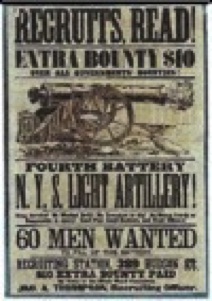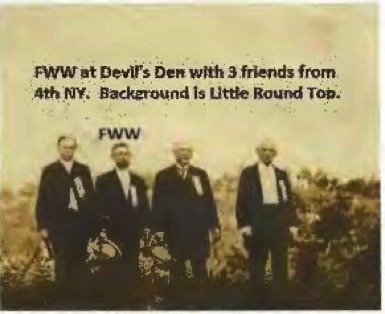


Frederick William Watkins is the Great Grand Father of Brother Ted Watkins. Frederick enlisted in the 4th NY Independent Battery (aka Smith's), as a private. The Battery was actively engaged in the siege of Yorktown, Battle of Williamsburg, and all of Third Corps engagements through Gettysburg.
In the book A Famous Battery and its Campaigns, written by Captain James Smith, says during the battle of Fredericksburg, the battery was stationed roughly where the tennis courts are in Pratt Park (500 yards north of the Lacy house). Caleb's battery was located about 2 miles further south, on the high ground across the river from the Mansfield house. Also, Frederick’s brother Caleb (also in the battery) said: "Our battery fired about twelve hundredshots at it (Fredericksburg) the first day. Father was over to see us the other day, he looked very well. His reg. had been across the river but had not been in the thickest of the fight." They took part in the Mud March and Chancellorsville prior to the Battery's travel to Gettysburg.
Frederick’s 1863 diary contains a day-by-day description of the march to Gettysburg: "Thur Jun 11 Cool and windy. A match at baseball came of today, between the 1st 9 of 7 NJ regt and 1st 9 of 4th NY B, after 9 innings the score stood 20 runs for 7 NJ and? for 4 NY. At 12 am were ordered to prepare to march instantly. ? 3d corps started and marched? quitting about midnight" This was the start of the movement from Falmouth to Gettysburg. The diary has a bullet hole, thus the "?", acquired from the fighting at Devil's Den on July 2, 1863. The diary, in all likelihood, saved Frederick’s life. "As I leaned forward to sight my gun (a 10-pound Parrott rifle cannon) and gave the order to fire, the rebels being close upon us." He was shot through his hat, diary, and more significantly, his thigh. The latter placing him in the hospital for 6 months.
After hospital his battery was disbanded so he joined his uncle's and brother's battery, the 5th NY. They spent the winter of 1863-64 in "Camp near the Rappahannock". "Uncle William, Cale, Sam Weir and myself all clubbed together and built one shanty, and live together, and each agree to contribute an equal share towards the expenses of the "house." The battery then participated in the Rapidan Campaign, Battle of the Wilderness, Laurel Hill and Spotsylvania Court House before being called back to the defense of Washington City.
Fred was furlough after his enlistment ended and before his subsequent reenlistment. He used the break to attend the "Free Military School for Applicants for Command of Colored Troops" in Philadelphia. Fred graduated at the end of March, was promoted to Captain and returned his unit for a few months before moving to Louisville, KY.
Fred was assigned to the 107th US Colored Infantry Regiment, which was yet to be formed so spent July and August with the 109th USCI in Kentucky. "Yesterday, we had to take the Battalion out for exercise and fired at man targets 10 in square, 100 yards distant. Though we had very inferior arms, (old smooth bore muskets) I thought they did very well for a first trial as they put 3 balls in the target and a good many others in close proximity. Today the 4th, the full Regt. of 10 Companies is to parade through Louisville and have a flag presented to them, and as the inhabitants are as strong secessionists as they dare to be, we anticipate some fun. I am well and very much pleased with affairs here. Please write soon and direct to Capt. F. W. Watkins, 109 Regt. U.S.C. Infantry, Louisville, Kentucky."
He was still in Louisville on Sept. 9th when he wrote, "We may possibly stay but it is more than likely that we shall go on this expedition. Whatever it may be I am prepared for it and I shall try and do my duty towards my country and towards the brave but ignorant men in my charge, and trust the rest in the hands of God." It is noteworthy that he and his fellow officers hired a teacher, purchased books and materials, and labored to educate the soldiers in the 107th By late Octoberthey were "near the front" in the vicinity of City Point. Fred wrote from the Siege of Petersburg on November 7 "The weather for several days past has been rainy and unpleasant, and this Virginia mud is getting to its usual winter consistency; so that the time for active operations will soon be closed."
On December 13th his frustration with the weather and the army was apparent when he wrote, "In our last camp near Fort Brady, I had been at work for a week building me a house as from all indications we were likely to stay all winter. I had built my house entirely of hewn logs, and had it nearly completed and as it was the best house in the regiment, I took considerable pride in it. One hours more work would have completed it, when suddenly about 8 o'clock one evening, orders were received to prepare to move immediately. But half an hour was allowed and at the end of the time, the regimental line was formed and I march away and leave my nice house behind. We marched about a mile and a half and took possession of a new camp some regiment had lately commenced but not finished. About half the men’s' quarters were built and very few for the officers. As it happened, my lot was to fall on bare ground as not there was not a sign of a house for the officers on Company G’s Street." They participated in the first and second Expeditions to Fort Fisher, the bombardment, and subsequent assault and capture of Fort Fisher.
Fred received a box from home for Christmas, "Lieut. Lehigh, my next neighbor had proposed that we should buy a goose between us for our "Christmas dinner" as the price was most too heavy for one alone to pay. As the Sutler only charges $5.00 a piece for geese and $6.00 for turkeys. The goose was bought and roasted and with the in the box made an excellent feast. But just before dinner time, our Major and Lt. Col sent me a pressing invitation to dine with them which I could not refuse so after inspection was over I had as much turkey, roast mutton, blackberry pudding &c. as I could eat and then came home and finished up on cake, nuts and apples." Later that evening an orderly brought over a copy of Sherman's dispatch to Lincoln, "Sir I present to you for a Christmas gift the City of Savannah with 150 pieces of Artillery and 20,000 bales of cotton which has just fallen into my hands."
Spring 1865 found the 107th in North Carolina, where they were transferred from the 25th Corps to the 10th· They were preparing to join Sheridan, in Goldsboro or possibly Raleigh, NC, in his chase of General Joe Johnston. On the third day of their march, they received the news of the surrender of Lee's army, so "pressed forward with renewed vigor in the pursuit of Johnston." That changed when they heard of the communications with Johnston for terms of surrender, "In the midst of all our joy, at the prospect of peace at an early day, comes the mournful intelligence of the assassination of President Lincoln. All hearts are filled with grief and the expression is universal throughout the army. That as Virginia is responsible for the deed, Virginia must be purged with fire and sword and her lands be made desolate--Gen. Sherman".
Fred was breveted to Major before Lincoln's assassination. His commission was signed by Andrew Johnson.
On April 25th Fred wrote, "We were inspected yesterday by the inspecting officer of the 2nd Division and he has reported this regiment the best in the Brigade. Lt. Col. Sells yesterday pronounced Companies B & G, the best in the regiment; consequently, we, Co. G, feel ourselves pretty near the top notch."
They heard Johnston had surrendered and switched from prosecution of the war to policing. 80 men from the regiment were sent to Snow Hill, Green County, "about a week ago, to organize a company of loyal citizens into a police force, for the preservation of order, and suppression of marauding in the county. We have found quite a number, who have been loyal to the union, all through the war, some of them have been persecuted and threatened with imprisonment by the secesh in the neighborhood." "We have got acquainted with all the girls in the village, some of them quite pretty too, and quite sociable. We have had invitations to take tea, at almost every house in the village, which of course we did not refuse."
On May 18th, Fred wrote, "We return to Goldsboro tomorrow, as we want to get there in time for a big meeting and barbeque that is to be held there, day after tomorrow, when sundry pigs are to be roasted whole. It will be something novel for us, though they say it is quite common in the south." From Morehead City he wrote, "The war is over, and large armies are no longer needed for field service. The white troops are being rapidly mustered out, and it appears to be the policy of the government, to retain the colored troops in the service." They left Morehead City in October and at City Point had a bit of a row with the operator of the Jarrett Hotel, "who is opposed to colored troops" and "in a very rude manner ordered them off."
Fred stayed with the army until mid May 1866. With so many young men looking for work after the war, he decided a Captain's pay to be a good living for a young man without a college education.
Headquartered at Fort Corcoran Alexandria, the regiment spent most of the time decommissioning forts around Washington.
Photographs of the colored troops, their band, and their officers were taken at Fort Corcoran on a day when Fred was in command there
After leaving the army, Fred attended New York University and graduated as a civil engineer. He was in charge of a major portion of the system's upgrade during the construction of the Groton Aqueduct, New York City's water supply. Fred was commandant of the Alexander Hamilton (NYC) Chapter of the GAR, visited Gettysburg on several occasions for anniversaries, and located the left flank marker for the 4th NY battery on Houck's Ridge above Devil's Den. The location is being disputed by latter day historians who apparently know more than the ex-corporal / published civil engineer who was in charge of the left most Parrott rifle on the day the battery was attacked at Gettysburg.